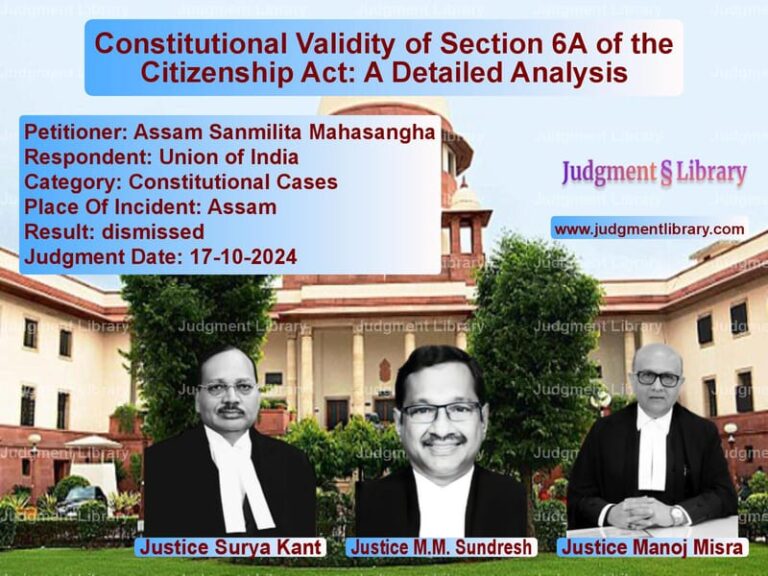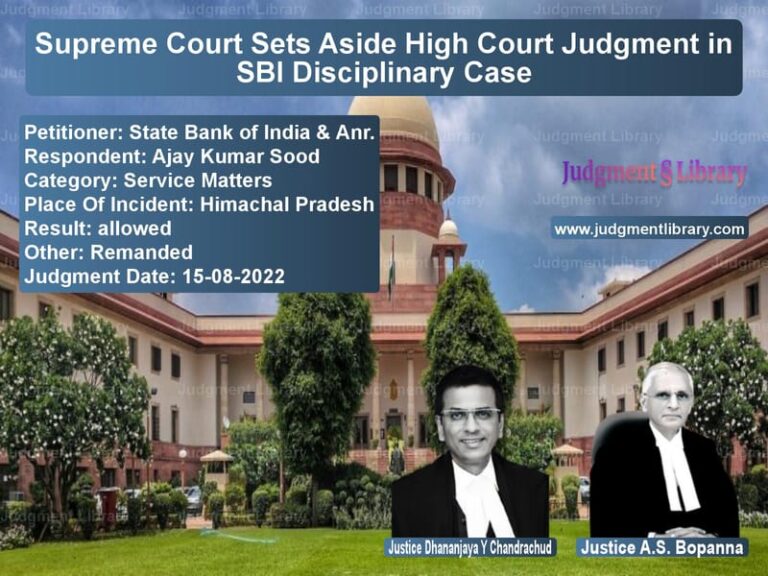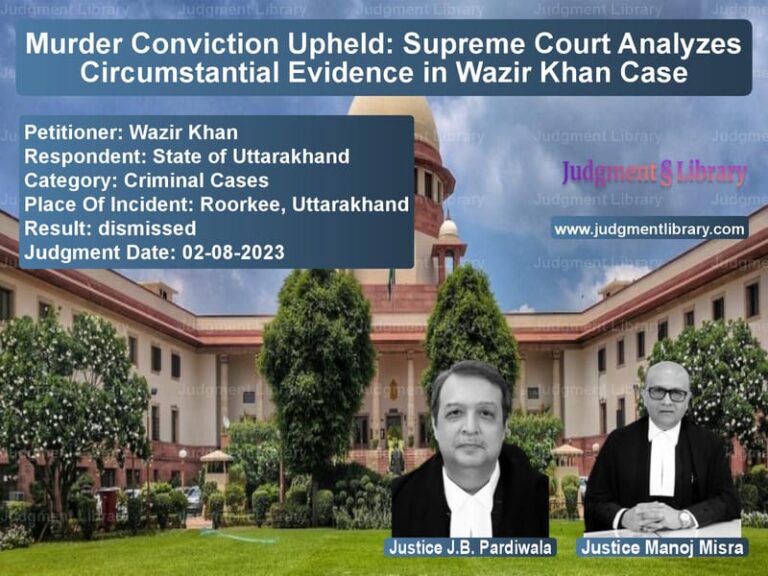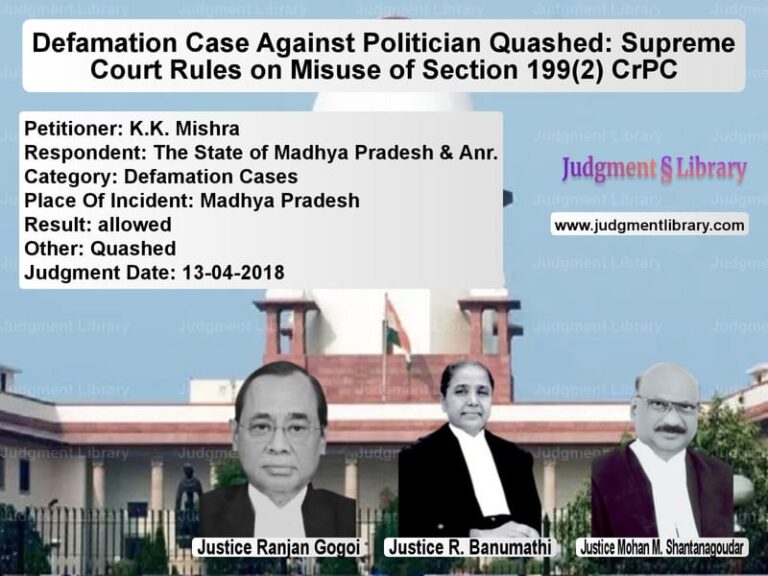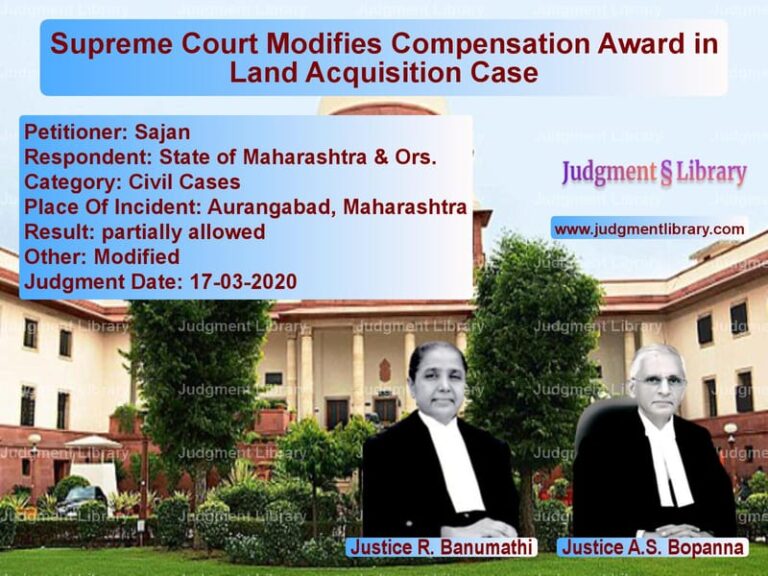Supreme Court Dismisses Petition Against Film ‘Aiyaary’ Over Defamation Claims
The Supreme Court of India recently delivered its verdict in the case of Adarsh Cooperative Housing Society Ltd. vs. Union of India & Ors., where the petitioner sought to halt the release of the feature film Aiyaary due to alleged defamatory content. The Court, after a thorough review, dismissed the petition and upheld the freedom of expression.
The petitioner, a registered housing society, filed a writ petition under Article 32 of the Indian Constitution, claiming that the movie included references to its land, building, and membership, which could harm its reputation and ongoing legal matters. The petitioner requested the removal of all references before the film’s release.
Arguments Presented
Petitioner’s Arguments
The legal counsel for the petitioner, Mr. Sanjay R. Hegde, argued that the film projected the society in an unfavorable manner, potentially influencing pending litigation and damaging the reputation of its members. The petition relied on various precedents, including R.K. Anand v. Registrar, Delhi High Court and State of Maharashtra v. Rajendra Jawanmal Gandhi, highlighting concerns about media trials and their impact on judicial proceedings.
Mr. Hegde emphasized that public perception created by films could override legal realities, leading to a “reel reflection” overshadowing the actual facts. He also cited the Bombay High Court’s judgment in Mushtaq Moosa Tarain v. Government of India, where concerns were raised about films interfering with the administration of justice.
Respondent’s Arguments
The respondents, representing the Union of India, contended that the film had received certification from the Central Board of Film Certification (CBFC) after consultations with the Army and other competent authorities. The respondents argued that freedom of speech and expression, guaranteed under Article 19(1)(a) of the Constitution, extended to cinematic works, provided they met the requirements of the Cinematograph Act.
The respondents further referred to previous rulings, including Viacom 18 Media Private Limited v. Union of India and Nachiketa Walhekar v. CBFC, which upheld the right of filmmakers to express ideas without undue censorship. The Court was urged to dismiss the petition, as restricting a film based on speculative harm would set a dangerous precedent.
Supreme Court Judgment
A bench comprising Chief Justice Dipak Misra and Justice Sanjay Kishan Kaul dismissed the petition, ruling that:
- The CBFC had lawfully issued certification after due diligence, including consultations with relevant authorities.
- A film’s content, even if loosely referencing real events, does not directly influence legal proceedings or defame individuals unless explicitly intended to do so.
- The doctrine of sub judice should not be overextended to prevent creative expression based on hypothetical concerns.
- Granting an injunction on mere speculation would infringe on artistic and cinematic freedoms.
Key Observations of the Court
In its reasoning, the Court emphasized:
“The moment the right to freedom of speech and expression is atrophied, not only the right but also the person having the right gets into a semi-coma.”
The judgment also referenced international precedents, including Kingsley International Pictures Corporation v. Regents of the University of the State of New York, where the U.S. Supreme Court held that freedom of expression extends even to controversial ideas.
On the issue of adding disclaimers, the Court clarified that such decisions fall within the domain of the CBFC and should not be imposed by judicial intervention unless there is clear legal justification.
Conclusion
The Supreme Court’s ruling reaffirmed the balance between freedom of expression and protection against defamation. The judgment set a precedent that artistic content should not be censored merely due to perceived reputational harm unless substantial legal grounds exist.
The ruling upholds the rights of filmmakers to create thought-provoking content while ensuring that genuine legal concerns are addressed through appropriate regulatory mechanisms rather than preemptive censorship.
Petitioner Name: Adarsh Cooperative Housing Society Ltd.Respondent Name: Union of India & Ors.Judgment By: Justice Dipak Misra, Justice Sanjay Kishan KaulJudgment Date: 16-02-2018
Don’t miss out on the full details! Download the complete judgment in PDF format below and gain valuable insights instantly!
Download Judgment: Adarsh Cooperative H vs Union of India & Ors Supreme Court of India Judgment Dated 16-02-2018.pdf
Direct Downlaod Judgment: Direct downlaod this Judgment
See all petitions in Civil Defamation
See all petitions in Criminal Defamation
See all petitions in Judgment by Dipak Misra
See all petitions in Judgment by Sanjay Kishan Kaul
See all petitions in dismissed
See all petitions in supreme court of India judgments February 2018
See all petitions in 2018 judgments
See all posts in Defamation Cases Category
See all allowed petitions in Defamation Cases Category
See all Dismissed petitions in Defamation Cases Category
See all partially allowed petitions in Defamation Cases Category


